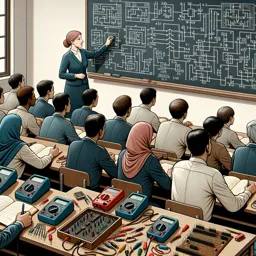
Free online courseBasic electronics
Duration of the online course: 6 hours and 4 minutes
Explore Basic Electronics by CircuitBread. Learn AC vs DC, multimeters, LEDs, transformers, and more. Perfect for aspiring electricians. Start your free course today!
In this free course, learn about
- Foundations of Electricity and Power
- Resistors, LEDs, and Basic Circuit Elements
- Measurement Tools and Basic Instrumentation
- LED Technology and Applications
- Semiconductors, Diodes, and Rectification
- Simulation, Control, and Circuit Laws
Course Description
The "Basic Electronics" course offers an extensive journey into the fundamental aspects of electronics, spanning six hours and four minutes. Rated highly at an average of 5 stars, this professional course, under the electrician subcategory, caters to those keen on mastering the core principles of electronics and electrical engineering.
Through engaging and informative sessions, students are introduced to the fundamental differences between AC and DC electricity, providing a strong foundation for understanding various types of electrical currents. An animated explanation demystifies power and phase, concepts crucial for grasping the intricacies of electric circuits.
The course delves into the essence of electricity, tracing historical discoveries like Benjamin Franklin's exploration of static electricity. Definitions and practical applications of current and voltage sources are clearly explained, equipping students with the knowledge to understand and create basic circuits.
Practical components like potentiometers, series and parallel resistor calculations, and resistor selection for LEDs are covered in detail. These sections empower students to handle real-world electronics projects with confidence. The course also includes essential hands-on learning, such as getting started with multimeters and using oscilloscopes, ensuring students can accurately measure and diagnose electronic components and systems.
Students explore the history, mechanics, and usage of LEDs, understanding forward voltage, working with RGB LEDs, and addressing common LED-related queries through a series of Q&A sessions. The course emphasizes the importance of resistors, voltage dividers, and methods to dim LEDs, solidifying the learner's grasp of these critical elements.
Further, the course investigates semiconductor classifications, rectification processes, and the practicalities of working with diodes and transformers. Simple animated overviews and practical demonstrations provide clarity on complex topics like half-wave and full-wave rectifiers, diode circuits, and transformer wiring.
Students also learn digital concepts such as binary, hexadecimal, and decimal conversions, broadening their understanding of numeric systems used in electronics. The course includes tutorials on LTspice and continuous rotation servo motors, expanding the learner's skill set in electronic simulation and motor control.
Ohm’s Law, alongside Kirchhoff's Current and Voltage Laws, is thoroughly explained with practice problems, allowing students to solve complicated circuits confidently. Fundamental explanations of voltage, current, and power lay a solid foundation for more advanced circuit analysis.
This comprehensive course ensures that learners not only acquire theoretical knowledge but also practical skills necessary for excelling in the field of basic electronics, making it an invaluable resource for aspiring electricians and electronics enthusiasts.
Course content
- Video class: The Difference between AC and DC Electricity | Basic Electronics 03m
- Exercise: _What is the main advantage of DC over AC for long distance transmission?
- Video class: A Simple Explanation of Power and Phase - With Animation | Basic Electronics 03m
- Exercise: What is a key benefit of three-phase power over single-phase power?
- Video class: What is Electricity? | Basic Electronics 03m
- Exercise: _What is the difference between conductors and insulators?
- Video class: How Benjamin Franklin discovered STATIC ELECTRICITY! | Basic Electronics 02m
- Exercise: What did Benjamin Franklin's experiments with rods demonstrate about charges?
- Video class: Current and Voltage Sources (With Definition) | Basic Electronics 03m
- Exercise: _What is a voltage source?
- Video class: Voltage, Current, and Power Explained - Laying the Foundation for Basic Circuits | Basic Electronics 07m
- Exercise: _What is the difference between current and voltage in a circuit?
- Video class: Potentiometer Basics - How they Work | Basic Electronics 06m
- Exercise: What is the main functional difference between a rheostat and a potentiometer?
- Video class: Calculate series and parallel resistor equivalence | Basic Electronics 05m
- Exercise: _What is the difference between resistors in series and resistors in parallel?
- Video class: How to select resistor values for LEDs | Basic Electronics 06m
- Exercise: How to determine the resistor needed for an LED circuit?
- Video class: How do resistors work? (Animated) | Basic Electronics 07m
- Exercise: What is the most common type of electronic component according to the discussion?
- Video class: How voltage dividers work - Voltage Division | Basic Electronics 08m
- Exercise: _What is a voltage divider and how does it work?
- Video class: Getting Started with a Multimeter | Basic Electronics 08m
- Exercise: _What are the three basic features that a multimeter can be used for in electronics?
- Video class: Oscilloscopes 101 - How to use an o-scope! | Basic Electronics 09m
- Exercise: What is the importance of manually adjusting the oscilloscope's trigger level?
- Video class: Ohm’s Law Tutorial with easy practice problems | Basic Electronics 15m
- Video class: History of LED Lights (light emitting diodes) | Basic Electronics 05m
- Exercise: _Who is credited with being the first person to intentionally create what we would consider an LED?
- Video class: LEDs and Forward Voltage | Basic Electronics 11m
- Exercise: What differentiates LEDs from incandescent and other traditional light bulbs?
- Video class: How an RGB LED works and how to use one! | Basic Electronics 07m
- Exercise: _What does RGB stand for in an RGB LED?
- Video class: Your LED questions ANSWERED! (Part 1) | Basic Electronics 13m
- Exercise: How do LEDs (Light Emitting Diodes) produce light?
- Video class: Why Are LED's Better? (Comparing different types of light bulbs) | Basic Electronics 18m
- Exercise: _What is the efficiency of incandescent bulbs?
- Video class: Power Dissipation in Circuits plus an EXPERIMENT | Basic Electronics 13m
- Exercise: Which component in its ideal form does not dissipate power?
- Video class: Your LED questions ANSWERED! (Part 2) | Basic Electronics 08m
- Exercise: _Are LEDs better than HIDs for car headlights?
- Video class: How to dim an LED - the two MOST COMMON ways | Basic Electronics 12m
- Exercise: What is one advantage of using LEDs for dimming over incandescent bulbs?
- Video class: Your LED questions ANSWERED! (Part 3) | Basic Electronics 15m
- Exercise: _Why do LEDs need a resistor?
- Video class: LED bulb teardown 2019! We take apart a CREE and Philips bulb | Basic Electronics 08m
- Video class: Single resistor for a common anode or common cathode RGB LED? | Basic Electronics 03m
- Video class: Classification of Semiconductors (Intrinsic/Extrinsic, P-Type/N-Type) 05m
- Exercise: _What is the most commonly used semiconductor material in the electronics industry?
- Exercise: _What is the most commonly used semiconductor material in the electronics industry?
- Video class: Half Wave Rectifiers - Practical Demonstration | Basic Electronics 08m
- Exercise: _What is the purpose of a half wave rectifier circuit?
- Video class: Binary, Hexadecimal, and Decimal Conversion – Simple Explanation | Basic Electronics 16m
- Video class: What is a diode? A simple animated overview | Basic Electronics 10m
- Exercise: _What is a diode?
- Video class: How to wire a transformer in series or parallel (with animation) | Basic Electronics 05m
- Video class: Full Wave Rectifier - Practical Demonstration | Basic Electronics 05m
- Exercise: _What is the advantage of using a full-wave rectifier over a half-wave rectifier?
- Video class: Full Wave Rectifier - Conceptual Review | Basic Electronics 04m
- Video class: Solving Diode Circuits | Basic Electronics 15m
- Exercise: _What is the method that the tutorial recommends to find the q-point of diodes?
- Video class: What is my transformer output with no load? | Basic Electronics 04m
- Video class: Full-wave Center-tapped Rectifier Tutorial | Basic Electronics 04m
- Exercise: _How many diodes are used in a center-tapped full-wave rectifier to rectify both positive and negative half-cycles of the AC input?
- Video class: LTspice - Getting Started in 8 Minutes 08m
- Video class: How to make a 360 degree Continuous Rotation Servo Motor 16m
- Exercise: _What is the difference between a regular servo and a continuous rotation servo?
- Video class: Kirchhoff's Current Law (KCL) - How to Solve Complicated Circuits | Basic Electronics 24m
- Exercise: _What is Kirchhoff's Current Law (KCL)?
- Video class: Kirchhoff's Voltage Law (KVL) - How to Solve Complicated Circuits | Basic Electronics 23m
This free course includes:
6 hours and 4 minutes of online video course
Digital certificate of course completion (Free)
Exercises to train your knowledge
100% free, from content to certificate
Ready to get started?Download the app and get started today.
Install the app now
to access the courseOver 5,000 free courses
Programming, English, Digital Marketing and much more! Learn whatever you want, for free.
Study plan with AI
Our app's Artificial Intelligence can create a study schedule for the course you choose.
From zero to professional success
Improve your resume with our free Certificate and then use our Artificial Intelligence to find your dream job.
You can also use the QR Code or the links below.

More free courses at Electrician

Free CourseSiemens PLC Training

9h42m

32 exercises

Free CourseElectronic Circuits Course

43h25m

49 exercises

Free CourseElectronic Circuit Design Course

9h31m

51 exercises

Free CourseWind Turbines

3h49m

19 exercises

Free CourseEngineering Circuits Analysis

3h11m

20 exercises

Free CourseElectricity course

31h41m

6 exercises

Free CourseElectronics - Nanoelectronics: Devices and Materials

40h15m

31 exercises

Free CourseElectrical - Fabrication of Silicon

35h10m

28 exercises

Free CourseElectrical engineering

11h53m

20 exercises

Free CourseBeginner Electronics

5h27m

24 exercises

Free CourseSiemens PLC Training
9h42m
32 exercises

Free CourseElectronic Circuits Course
43h25m
49 exercises

Free CourseElectronic Circuit Design Course
9h31m
51 exercises

Free CourseWind Turbines
3h49m
19 exercises

Free CourseEngineering Circuits Analysis
3h11m
20 exercises

Free CourseElectricity course
31h41m
6 exercises

Free CourseElectronics - Nanoelectronics: Devices and Materials
40h15m
31 exercises
Free CourseElectrical - Fabrication of Silicon
35h10m
28 exercises

Free CourseElectrical engineering
11h53m
20 exercises

Free CourseBeginner Electronics
5h27m
24 exercises
Download the App now to have access to + 5000 free courses, exercises, certificates and lots of content without paying anything!
-
100% free online courses from start to finish
Thousands of online courses in video, ebooks and audiobooks.
-
More than 60 thousand free exercises
To test your knowledge during online courses
-
Valid free Digital Certificate with QR Code
Generated directly from your cell phone's photo gallery and sent to your email

Download our app via QR Code or the links below::.








Course comments: Basic electronics
CIRRO
thanks my only teacher